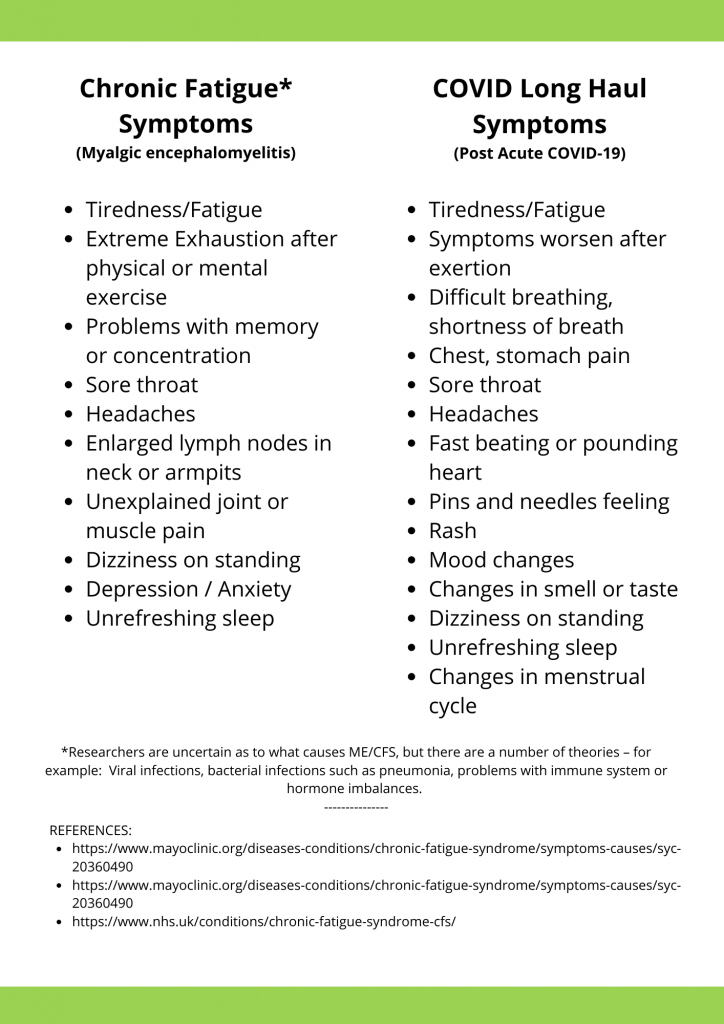I know what it’s like to drag myself through every day… To never feel rested no matter how much I slept, to feel achy for no apparent reason and the mood swings and brain fog!?!?!?!
No, I’m not describing long Covid – this is how I felt for years when I had chronic fatigue.
The GOOD NEWS is… I was able to completely reverse my symptoms.
The similarities between Chronic Fatigue and Covid Long Haul are most definitely worth noting…

An underlying factor with both >>> Mitochondria function
- The link between immune cell function and mitochondrial function is well-recognized, in a field known as “immunometabolism”.
- Researches are now suggesting that mitochondrial dysfunction could be playing a role in both chronic fatigue syndrome and COVID-19 long haulers.
What are Mitochondria?
Mitochondria are the energy powerhouses of the cell. Nearly every cell in the body has several thousand mitochondria. By processing oxygen and converting nutrients from the foods we eat, mitochondria produce 90% of the energy our bodies need to function
Mitochondria and COVID
- Emerging evidence suggests that COVID highjacks the mitochondria of the immune cell
- Impaired mitochondrial function can lead to cell death
- Mitochondrial dysfunction plays a crucial role in cardiovascular disease (See symptoms above)
- Mitochondria play a key role in the correct function of immune cells in the lung (See symptoms above)
Strategies to Support Mitochondria Function
Nutrition:
3. Mitochondria are sensitive to toxins and inflammation. “Cleaning” up the diet by avoiding processed foods and maintaining a healthy gut barrier are essential.
4. Magnesium rich foods such as organic dark green leafy vegetables, organ meats and whole grains
Lifestyle:
1. Exercise helps to increase multiple mitochondrial pathways in healthy individuals. BUT, if you’re already experiencing fatigue an exercise regiment can actually make your symptoms worse.
2. Gentle exercise like Tai Chi, Restorative Yoga, going for a walk, gentle stretching can help keep blood flowing while you slowly build back up.
3. Stress management is key – while we cannot always control the amount of stress we have in our lives we can help to manage how we react to stress. Breathing exercises, meditation, energy work, massage and Reiki are a number of ways to help support you.
4. Sleep is when our bodies heal and studies do show that lack of sleep can have a negative effect on our mitochondria. Practicing good ‘sleep hygiene’ is imperative:
- Going to bed and waking up at the same time each day
- Sleeping in a very dark room
- Remove electronic devices from bedroom
- Don’t eat a large meal too close to bedtime
- Manage blood sugar to avoid waking in the middle of the night
Supplements:
2. *Pyrroloquinoline Quinone (PQQ) possesses a number of health benefits including treatment of neurodegenerative diseases because of its anti-inflammatory potential
4. *B Vitamins regulate the activity of mitochondrial enzymes
5. *Alpha lipoic acid (ALA) and Coenzyme Q10 protect mitochondrial biogenesis (process of renewal and repair)
*Available at my online dispensary Fullscript – See below.
REFERENCES:
https://www.frontiersin.org/articles/10.3389/fnagi.2020.614650/full
https://www.livescience.com/50679-mitochondria.html
https://www.ncbi.nlm.nih.gov/pmc/articles/PMC7998762/
https://www.ncbi.nlm.nih.gov/pmc/articles/PMC7344641/
https://www.ncbi.nlm.nih.gov/pmc/articles/PMC8957137/#:~:text=In%20addition%20to%20providing%20energy,reactive%20oxygen%20species%20(ROS).
https://www.hindawi.com/journals/omcl/2019/7058350/
https://www.npr.org/sections/health-shots/2017/10/02/554369327/for-people-with-chronic-fatigue-syndrome-more-exercise-isnt-better
https://www.ncbi.nlm.nih.gov/pmc/articles/PMC5901654/#:~:text=Under%20stress%2C%20mitochondrial%20can%20swell,fats%2C%20respectively%20(27).
https://pubmed.ncbi.nlm.nih.gov/33821750/
https://www.everydayhealth.com/coronavirus/mitochondrial-dysfunction-may-be-to-blame-in-long-covid-19/
https://www.ncbi.nlm.nih.gov/pmc/articles/PMC5005540/#:~:text=Creatine%20Prevents%20the%20Structural%20and,Restores%20Their%20Differentiation%20Capacity%20%2D%20PMC&text=The%20.
https://www.ncbi.nlm.nih.gov/pmc/articles/PMC5577592/
https://www.sciencedirect.com/topics/medicine-and-dentistry/ergothioneine
https://www.nature.com/articles/s41514-022-00083-0#:~:text=PQQ%20not%20only%20protects%20mitochondria,and%20function%20in%20mice29.
https://www.ncbi.nlm.nih.gov/pmc/articles/PMC6078194/
https://www.ncbi.nlm.nih.gov/pmc/articles/PMC5516748/
https://www.ncbi.nlm.nih.gov/pmc/articles/PMC8910660/
https://www.ncbi.nlm.nih.gov/pmc/articles/PMC6379835/#:~:text=Since%20the%20activity%20of%20mitochondrial,orchestrated%20by%20these%20mitochondrial%20enzymes.&text=Molecular%20structures%20of%20the%20eight%20B%2Dvitamins.
https://ods.od.nih.gov/factsheets/PrimaryMitochondrialDisorders-HealthProfessional/



